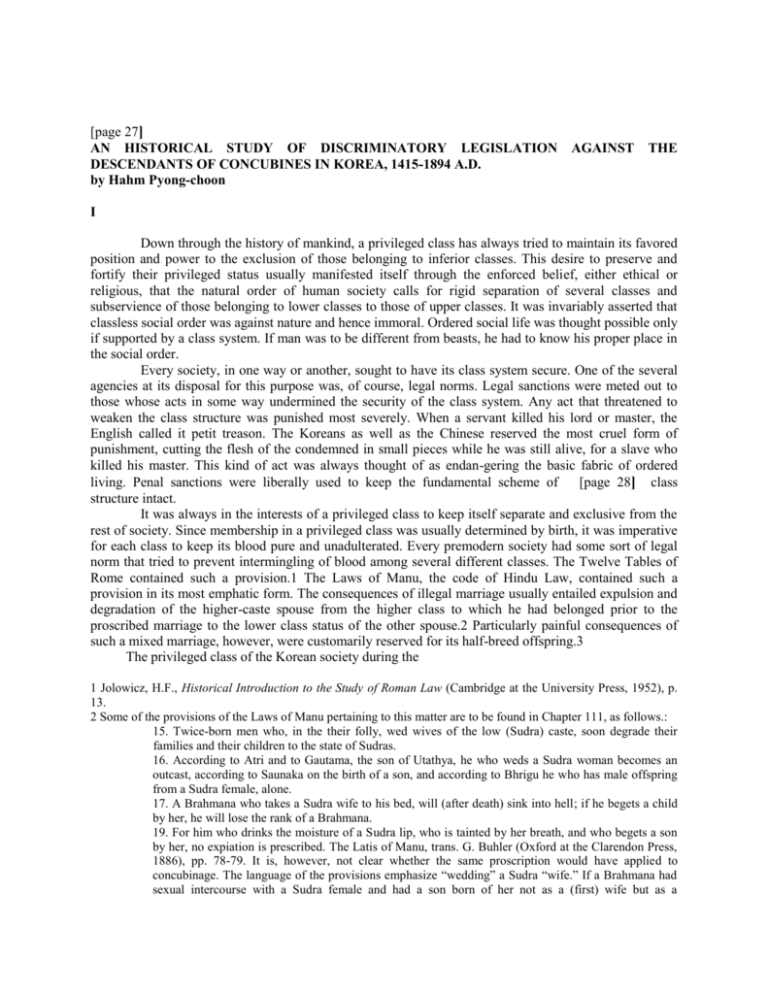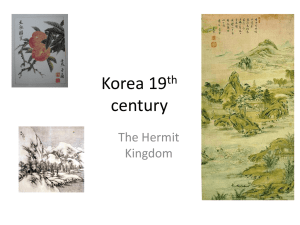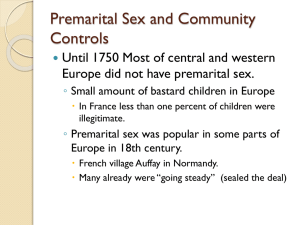An Historical Study of Discriminatory Legislation Against the
advertisement

[page 27] AN HISTORICAL STUDY OF DISCRIMINATORY LEGISLATION DESCENDANTS OF CONCUBINES IN KOREA, 1415-1894 A.D. by Hahm Pyong-choon AGAINST THE I Down through the history of mankind, a privileged class has always tried to maintain its favored position and power to the exclusion of those belonging to inferior classes. This desire to preserve and fortify their privileged status usually manifested itself through the enforced belief, either ethical or religious, that the natural order of human society calls for rigid separation of several classes and subservience of those belonging to lower classes to those of upper classes. It was invariably asserted that classless social order was against nature and hence immoral. Ordered social life was thought possible only if supported by a class system. If man was to be different from beasts, he had to know his proper place in the social order. Every society, in one way or another, sought to have its class system secure. One of the several agencies at its disposal for this purpose was, of course, legal norms. Legal sanctions were meted out to those whose acts in some way undermined the security of the class system. Any act that threatened to weaken the class structure was punished most severely. When a servant killed his lord or master, the English called it petit treason. The Koreans as well as the Chinese reserved the most cruel form of punishment, cutting the flesh of the condemned in small pieces while he was still alive, for a slave who killed his master. This kind of act was always thought of as endan-gering the basic fabric of ordered living. Penal sanctions were liberally used to keep the fundamental scheme of [page 28] class structure intact. It was always in the interests of a privileged class to keep itself separate and exclusive from the rest of society. Since membership in a privileged class was usually determined by birth, it was imperative for each class to keep its blood pure and unadulterated. Every premodern society had some sort of legal norm that tried to prevent intermingling of blood among several different classes. The Twelve Tables of Rome contained such a provision.1 The Laws of Manu, the code of Hindu Law, contained such a provision in its most emphatic form. The consequences of illegal marriage usually entailed expulsion and degradation of the higher-caste spouse from the higher class to which he had belonged prior to the proscribed marriage to the lower class status of the other spouse.2 Particularly painful consequences of such a mixed marriage, however, were customarily reserved for its half-breed offspring.3 The privileged class of the Korean society during the 1 Jolowicz, H.F., Historical Introduction to the Study of Roman Law (Cambridge at the University Press, 1952), p. 13. 2 Some of the provisions of the Laws of Manu pertaining to this matter are to be found in Chapter 111, as follows.: 15. Twice-born men who, in the their folly, wed wives of the low (Sudra) caste, soon degrade their families and their children to the state of Sudras. 16. According to Atri and to Gautama, the son of Utathya, he who weds a Sudra woman becomes an outcast, according to Saunaka on the birth of a son, and according to Bhrigu he who has male offspring from a Sudra female, alone. 17. A Brahmana who takes a Sudra wife to his bed, will (after death) sink into hell; if he begets a child by her, he will lose the rank of a Brahmana. 19. For him who drinks the moisture of a Sudra lip, who is tainted by her breath, and who begets a son by her, no expiation is prescribed. The Latis of Manu, trans. G. Buhler (Oxford at the Clarendon Press, 1886), pp. 78-79. It is, however, not clear whether the same proscription would have applied to concubinage. The language of the provisions emphasize “wedding” a Sudra “wife.” If a Brahmana had sexual intercourse with a Sudra female and had a son born of her not as a (first) wife but as a “concubine,” the prohibition might not have applied. Also, the injunction seems to have been only against wedding a female of “Sudra” caste, leaving marriages to females of two other lower castes outside its scope. [page29] Yi dynasty (1392-1910 A.D.), the yangban class, also tried to maintain its purity by excluding the offspring of mixed marriages from its ranks.4 It did not, like the Hindu, prohibit the mixing of blood itself. It did not condemn those yangban who had sexual relationships with women of inferior classes. It did not expel recalcitrant members or deprive them of their yangban status. It merely sought to protect the purity of its blood by excluding the offspring of mixed marriages from the enjoyment of those privileges and immunities appertaining to a yangban. The exclusion was accomplished through a royal decree which was later turned into a provision of a code, that barred 3 Some of the pertinent provisions of the Laws of Manu are as follows:. X. 5. In all castes (varna) only those children who are begotten in the direct order on wedded wives equal in caste and married as virgins, are to be considered as belonging to the same caste as their fathers. X. 6. Sons begotten by twice-born men on wives of the next lower castes declare to be similar to their fathers, but are blamed on account of the fault inherent in their mothers. IX. 178. The son whom a Brahmana begets through lust on a Sudra female is, though alive (parayan), a corpse (sava), and hence called a parasava (a living corpse). Ibid., 402-403, 364. 4 It is customary to divide the Korean society of this period into four classes. The highest class was called yangban. This word means the two branches of bureaucracy, civilian and military. The second highest class was called chungin. The word means men of middle class. This class was composed mainly of petty officials of government agencies. They were very powerful because they handled the day-to-day operations of the government and without their technical knowledge the actual administration was impossible. The third class was called sangin. It means ordinary or common people. Those who were engaged in agriculture, manufacturing and commerce belonged to this class. The lowest class was called ch’onin. Slaves, butchers, prestitutes, shamans, etc., belonged to this class. In which of these four classes we should include the descendants of concubines is a difficult problem. It could very well be argued that they constituted a separate class by themselves. The actual social status of each one of them seems to have been determined by the official rank and political power of his father and former class status of his mother. Thus, if his father was a yangban of low rank and little power and his mother was a former slave-girl, his social standing was even lower than that of a sangin. On the other hand, if his father was a yangban of high rank and great power and his mother was sangin or even chungin, his social standing was even slightly higher than that of a chungin . [page30] the descendants of mixed marriages from taking the kwago, a kind of civil service examination. Inasmuch as the membership in the yangban class was dependent upon one’s ability to pass the examination and to progress to a higher position on the bureaucratic hierarchy, the deprivation of the right to take the examination effectively degraded them to an inferior class status5. The discriminatory law we are about to study was unique to Korea. Neither China nor Japan had such a law. This fact, along with the currently prevailing concern of mankind with the problem of racial discrimination, has led the writer to investigate the circumstances and the social forces that led to the enactment of such legislation, and to analyze the consequences—mostly unforeseen at the time of enactment—flowing from its enforcement. II Prior to the founding of the Yi dynasty in 1392 A.D., polygamy was the prevailing mode of married life. Under the polygamous marriage system, all the wives and their offspring were placed on the same footing. As the new dynastic rule commenced, however, a drastic change came upon the marital life of the nation. Henceforward, there was to be one lawful wife and any other women espoused 5 One could easily think of the possiblity of falsifying one’s birth and taking the examination. But this was a very difficult thing to do in a closed society such as Korea of this period. Any such cheating, if discovered, was severely punished. Furthermore, every applicant was required to specify the names of his ancestors for eight generations on both paternal and maternal sides. Also, he had to state the name of his father-in-law. One feels strange to read about this type of practice being repeated in Hitler’s Germany. In 1935, Max Amann, Presseleiter, required newspaper publishers to trace their own and their wives, racial “purity” back through four generations. Hale, O.J., The Captive Press in the Third Reich (Princeton, N.J., Princeton University Press, 1964). During the periods immediately following the Hideyoshi and Manchu invasions, however, there were in fact a few who succeeded in lying about their ancestry and attained relatively high ranks in the bureaucracy. But they were eventually discovered and made common slaves in far-off islands after receiving their share of public floggings. [page31] by a man already married were to be designated concu- bines.6 By a royal decree issued in the fifteenth year of King T’aejong (1415 A.D.), the third monarch of the dynasty, the descendants of concubines were to be barred from a dozen or so of the highest offices of the kingdom. This edict naturally had immediate repercussions in the pattern of marriages among the yangban class. It in no way disrupted already existing concubinages. Male yangban continued to have concubines. But in arranging 6 The status of concubines needs some explanation. They were usually of lower class origin. No yangban female ever became a concubine. When a yangban took a concubine (there was no legal or customary limit to the number), and if the woman was from the second or third class, he would usually go through a modified form of wedding ceremony. A few rituals would be omitted from the standard ceremony, or a modification would be made in the costumes of the bridegroom. A concubine was usually given a separate house. But sometimes a few concubines with their children would live under the same roof with the legitimate wife and her children. If a wife showed jealousy, the husband had the right to divorce the wife. No virtuous wife was supposed to show jealousy when her husband took a concubine and brought her into the house to live together. A concubine occupied a lower position in a household. She had to stand while the wife sat down and she had to use language that showed respect when she addressed the wife. Also, she was subordinate to the legitimate wife in respect to her legal rights. For example, if a man killed his wife, the penalty was death by hanging. But if he killed his concubine, the penalty was flagellation and exile. The actual position of a concubine, however, was not always inferior to that of a legitimate wife. A man might become so enamoured of a concubine, especially when he was old and the girl was very young and smart, as to completely desert his legitimate wife and children. The man might give all of his property and income to his concubine, impoverishing his legitimate family. If a concubine was a former slave girl, no ceremony of any kind would be held. In this case, a man would buy the girl and live with her. If the girl was his own slave, there would be no problem. But if the girl was owned by someone else, then he had to pay for the girl and make her a sangin. Otherwise, any children born of a female slave would belong to the owner of the slave. Although a wife might not show jealousy, it was only natural that she hated concubines from the bottom of her heart. Her resentment and burning hatred must have been indelibly etched on to the minds of her children from childhood. Under these circumstances, it was only human for a roan of legitimate birth to treat another of illegitimate birth with hatred and vengeance. He must have felt that he was avenging his mother’s unhappiness when he discriminated brutally against the offspring of concubinage. [page 32] marriages for their children, they began to insist on the legitimacy of prospective children-in-law. Every yangban became very reluctant to give his daughter to a son or a grandson of a concubine, or to receive a daughter or a granddaughter of a concubine as a legitimate spouse of his son or grandson. No yangban relished the prospect of his descendants, at least of his legitimate wife, being degraded to the status of second-class yangban. He wanted to have his family remain full-fledged yangban. How did this kind of royal decree ever get promulgated? Through the centuries, the descendants of concubines held one Sŏ Sŏn, who was T’aejong’s chamberlain, responsible for the issuance of the discriminatory decree. As to the reason why he recommended the issuance of such a royal edict, people were wont to adduce his personal jealousy and animosity against one Chŏng Tojŏn. For his meritorious service in the overthrow of the old Koryŏ dynasty and the establishment of the new dynasty, Chŏng attained very high office and became a powerful personage in the government. So is said to have had a personal grudge against Chŏng whose favorite slave had once humiliated him. But one chamberlain’s personal enmity with one of the chief vassals cannot have been be a sufficient reason for the issuance of such a royal decree. Historical records indeed show that So did in fact recommend the promulgation of the decree. But there must have been some other, and far more substantial, reasons for its promulgation. What were those reasons? For one thing, T’aejong had his own reasons for issuing the dis-criminatory decree. His reasons can be found in the circumstances that led to his accession as the third monarch of the dynasty. The founder of the dynasty, T’aejo, had two wives. His first wife had died before he founded the dynasty. By his first marriage he had six sons and by his second two sons. As soon as the new dynastic rule commenced, the matter of designating the royal successor became the most important question of the day. Among his eight sons, [page 33] the fifth, Pangwŏn, who later became T’aejong, was most able and had done most for the founding of the dynasty. Therefore, most courtiers recommended that Pangwŏn should be designated the crown prince, although in ordinary days the eldest son ought to be so designated. But T’aejo tended to favor the two sons of his second marriage. The second wife was very much alive and wielded much influence upon his thinking. Due to his (or it may be more correct to say, his second wife’s) insistence, his youngest son was finally designated as the crown prince. This understandbly made ambitious Pangwon very unhappy. He decided to do something about it. But he had to wait for six years. In the seventh year of T’aejo (1398 A.D.), the opportunity he had been waiting for for the past six years finally arrived. Fearing a bloody fight for the throne among the royal princes, Chŏng recommended to the king that all the royal princes should be ordered out of the capital and dispersed to the countryside. Thereupon, Pangwŏn counterattacked by charging that certain of his father’s chief vassals were conspiring with his half-brothers to eliminate all the princes of his father’s first marriage. With a few of his personal retainers, he killed Chŏng and a few others who were loyal to the crown prince. He also killed both his half-brothers. In this bloody family quarrel, Pangwon used the precedence of age as his justification. Then he had his oldest living brother, Panggwa, designated as the new crown prince. Although he wanted the crown princedom for himself, he could not ask for it. He could not go against his own justification for killing his half-brothers. He had no justification for becoming a crown prince because his older brothers were alive. And he had reason to acquiesce in Panggwa’s designation as the crown prince. He knew that Panggwa had no real ambition for the crown. Furthermore, Panggwa had no issue born of his first wife. With this fact in mind, Pangwon knew that he could wait a little longer. [page 34] Disgusted with the bloody family quarrel and saddened by the untimely deaths of his favorite sons, T’aejo abruptly abdicated the throne. And the new crown prince became Chŏngjong, the second monarch of the dynasty. As soon as Chŏngjong ascended the throne, again the question of designating the successor was raised. And again a bloody family quarrel broke out among the royal princes. While the new king had fifteen sons and eight daughters from various wives, his first wife gave him no son. Therefore, Pangwon did not have to worry too much about his nephews. But he had to do something about his two older brothers. The third brother quickly made it known that he did not want the crown. But the fourth brother, Panggan, was more ambitious and stubborn. A fight broke out. Panggan was defeated. He died of sickness in exile. With the permission of T’aejo, the king abdicat, Pangwŏn was finally designated as the crown prince. Ten months later, less than two years on the throne, Chŏngjong abdicated in favor of his younger brother, the crown prince. The ruthlessly enterprising prince finally realized his age-old ambition and became the third monarch of the dynasty, T’aejong. Although in fact there was no justification for his ascension but his burning ambition, T’aejong felt constrained to find a justification for displacing his nephews, Chŏngjong’s sons. His justification was simple enough. Chŏngjong had no legitimate son. Now he became a champion of legitimate wives and children. Furthermore, that archtraitor Chŏng Tojŏn was alleged to have been a son of a concubine. Thus, T’aejong had every reason to revile the descendants of concubines. Then there was another factor that reinforced T’ae-jong’s discriminatory tendency against the offspring of concubinage. His own grandfather had three wives. A son had been born of each of the three wives, his father, T’aejo, being of the second wife. T’aejong decided to put the family tree in order. In revising the family register, 7 Most historians consider this allegation to be entirely false. [page35] he designated his grandmother, though she was the second wife, as the legitimate wife of his grandfather, Consequently, his two uncles became illegitimate brothers of his father. His reason for thus revising the family history was to deprive the descendants of his uncles of any claim to the throne. But his uncles and cousins did not like it. Moreover, it was very difficult to find a correct way of treating the royal uncles and cousins. Particularly, the older uncle and his children expected a treatment commensurate with their position as the family of the first-born.8 This caused the royal family a great deal of embarrassment. The unhappy royal relatives came to show their displeasure and this was interpreted by the court as insolence. Some courtiers even advocated the punishment of the recalcitrant royal relatives as treasonous rebels. T’aejong himself was very much angered. Nevertheless, he refused to take punitive action against them. Instead, he ordered them to return to the northeastern border region from which the royal family had come originally. Thus banished from the capital, the disaffected relatives caused no further embarrassment to the crown. But the necessity of emphasizing the difference and the separateness between the legitimate and the illegitimate was once again strongly felt by the king and his court. III Underlying the foregoing factors and working in favor of discrimination was the moralistic tendency in Confucian ethics disfavoring concupiscence. Confucian ethics strongly disapprove of promiscuous sexual relationships, albeit the disapproval runs more against the female sex than against the male. The founders of the new dynasty considered it expedient to condemn the corruption of 8 This situation is somewhat like what we find between the Israelites and the Arabs as to their respective claims to be the rightful heirs of Abraham. In nay event, the court historians finally degraded the first and third wives of T’aejong’s grandfather to the status of slaves, justifying the royal family’s claim to legitimacy. On the simple basis of chronological order of marriages, one could argue the opposite wit perhaps more justification. . [page 36] Buddhism, which had been the national religion of the preceding dynasty, and substituted Confucianism in its stead. During the preceding Koryŏ dynasty, especially toward its end, the sexual morality of the people had been very loose. When T’aejong accepted the recommendation for a discriminatory decree as a measure to alleviate the suffering of the people due to a severe drought that was plaguing the nation at the time, he was tightening the loosened morality of the people, appeasing at the same time the angry Nature that was chastening the nation for its depravity. Implied in this effort was a strong endorsement of monogamy, at least, among the yangban class. T’aejong was, thus, uplifting the moral standard of the nation when he issued the decree barring the descendants of concubines from the nation’s high offices. One could, of course, easily find a better and more effective way of rectifying the moral laxity of the people than to discriminate against the offspring of concubinage. It would be more logical to outlaw concubinage itself rather than to penalize the offspring who were in no way to blame for their being born of concubinage, In other words, monogamy could be enforced strictly, punishing adultery and fornication severely. As in the Hindu law, any yangban having sexual intercourse and thereby giving birth to a son by a woman of lower class could be deprived of his membership in the privileged class and degraded to the lower class status of his partner in the forbidden liaison. But then, concubinage existed from time immemorial. No yangban wanted to lose this important privilege. The fact that one could afford a few concubines was an effective demonstration of his affluence and prestige. Every male yangban wanted to be able to enjoy all the privileges of yangban, not the least of which was concubinage. Behind the moralistic facade of the discriminatory legislation, there existed a far more important yet hidden reason for the edict. The social force at work that produced the enactment must be found in the internal logic of the class system itself. As was mentioned at the outset, [page 37] every privileged class endeavors to curtail its membership as much as possible. It wishes to limit the scope of distribution of its privileges and immunities, increasing thereby the share of privileges each member enjoys. It does its utmost to preserve its monopoly on privilege and power. The last thing it allows is to let the distinction among classes become indistinct. It struggles to keep class demarcation intact and permanent. As a rule, every discriminatory practice has an inherent tendency to become more and more discriminatory. The discriminatory practice against the descendants of concubines was no exception. Initially the decree merely barred men of illegitimate birth from occupying the high offices of the land. But when the first codified law of the dynasty, Kyongguk Taejon, was formally promulgated in the fifth year of Sŏngjong (1474 A.D.), the ninth monarch of the dynasty, in it there was a provision barring the descendants of concubines from taking kwago, the civil service examination. Now the discrimination became more rigorous. Men of illegitimate birth were to be excluded from the government service entirely. As to those of illegitimate birth already in the bureaucracy, the code specified various ranks beyond which they could not progress, the maximum rank being determined by their immediate ancestors’ rank in the government service and their mother’s original class status.9 9. For example, if his father or grandfather had progressed beyond the rank of second grade, the highest being the first grade, and if his mother was born of a freeman, he could be promoted up to the third grade, but if his mother was born of a slave, he could not be promoted beyond the fifth grade. And if his father or grandfather had not progressed beyond even the seventh grade rank, he had to stop at the fifth grade or the seventh, depending on his mother’s former class status. There were nine grades each in regular and secondary bureaucratic rankings. There were other technical and minor positions, quite large in number, outside the regular bureaucracy. Those whose forebears had progressed beyond the second grade had no restrictions placed upon them in such technical fields of government service as translation-interpretation, medicine, law, astronomy meteorology and geomancy. [page38] Thus effectively deprived of membership in the yangban class to which his father and his legitimate half-brothers still belonged, a son of a concubine found himself a total outcast in the society in which he was born. He was spurned by his father’s class and scorned by lower classes. He found his name completely omitted from the family tree. He could not call his father, “father.” He had to employ the form of language used by servants when they addressed their master. He could not call his half-brother, “brother.” Even his younger half-brother was his superior. If he went to a place of study, such as sŏwŏn or Sŏnggyun’gwan, he would find his name not listed in the roll and had to find the lowest seat. Though the seating arrangement was determined by seniority in terms of age, a son of a concubine who was forty years of age would still find himself seated below a young scholar of fourteen. In some families, he was not allowed to participate in ancestor worship rites. And, as the time went by, the discrimination became more cruel and harsh. Originally, it was provided in Kyŏngguk Taejŏn that a family may adopt a male child from another family within the same clan as an heir, whose primary duty it was to continue the family name and to keep up the ancestor worship rites. But not every family was allowed to adopt an heir. If there was a male child born of either the wife or a concubine, that male issue had to be designated as heir and no adoption was allowed. Moreover, the most important reason for getting a concubine was to get a male child in the first place. But it soon became a firmly established custom to adopt a legitimate offspring from another family rather than to let an illegitimate child become an heir. Even though it would be more human to let one’s own flesh and blood become an heir than to let a total stranger be put in charge of ancestor worship, no yangban wanted his family to be deprived of yangban status. It was the choice between honoring one’s blood relationship, on the one hand, and honoring one’s duty toward ancestors to keep the family within the class and assure a yangban heir, on the other. Many a yangban [page 39] was torn between his natural affection for his own flesh and blood and his filial duty to his ancestors to keep the family yangban. From the point of view of illegitimate sons, this filial duty to keep the family yangban was simply a subterfuge for perverting natural affection in favor of avarice for power and prestige. But in almost all cases cupidity for power and privilege triumphed over natural affection. No legal rule can ever expect to be observed absolutely. Nevertheless, the provision in the Kyŏngguk Taejŏn that adoption was to be allowed only when there was no male issue, either legitimate or illegitimate, was most flagrantly violated. Before we condemn the yangban class for lack of respect for the law, however, it must be remembered that unless the several provisions of a code harmonize with one another, all the code provisions may be rendered ineffective due to poor drafting. The draftsmen of the code failed to realize that, with the provision barring the descendants of concubines from taking the civil service examination, the provision sanctioning the designation of an illegitimate offspring as a lawful heir could never be enforced effectively. The fact that a yangban family had an illegitimate heir meant that it would eventually be excluded from the class. Understandably, no yangban family wanted this fate to befall it Had there been a provision allowing legitimation of an heir, though originally born illegitimate, the provision relating to adoption would have been better observed. It may have been true that the drafters simply did not foresee the turn of events that followed its promulgation. And had they been able to foresee it, they would have done something about it. But it was in the nature of any discriminatory law to become more and more discriminatory and intolerant. Had it taken a milder form, as had originally been decreed by T’aejong, it would inevitably have become as discriminatory as it actually became. The same exclusionary forces and pressures would have operated. And the privileged class would not have. [page 40] rested until it had totally excluded those elements that might perchance demoralize or corrupt its integrity and purity. Having been in reality superseded by contrary customs, the code provision concerning adoption had to be finally amended to harmonize with the mores of the yangban class. So, in the twenty-first year of Yŏngjo (1745 A.D.,) the twenty-first monarch of the dynasty, when an amended version of Kyŏngguk Taejŏn known as Sŏktaejŏn was promulgated, the provision was amended to allow adoption in cases where there was no legitimate male issue. It became legal, thenceforward, to adopt a male from another family within the same clan as an heir, albeit there was an illegitimate male issue. Thus, the exclusionary legislation again became more rigid and harsh. IV Made an outcast and deprived of what he considered to be his birthright, a person of illegitimate birth found the world cruel and unjust. More often than not, he could not resign himself to accepting the status of a common man without any privilege or respectable livelihood. His burning obsession was to break down the discriminatory barrier and be admitted into the social class of his father. Some of his halfbreed peers did accept the status of a common man and became minor officials or learned to live by a trade or a profession. But he, like most of his peers, wanted to be able to share the privileges and powers of his father. Especially, if his father was a courtier of high rank and of great power and he saw how much his half-brothers enjoyed these things, he just could not give up that easily. Hot-blooded and adventurous types wanted to remake society in their own images. They wanted to turn the existing social order upside-down. They wanted to do something daring and audacious. They did not want to accept the inhumanity of the existing social order passively. [page 41] without a fight. Few succeeded in overthrowing the unjust social order, however. Most of them were hunted down and summarily killed as treasonous rebels. Some became Robin Hood-type robbers. But they too eventually were caught and executed. Spiritless ones became hangers-on of their half-brothers or other rich and powerful relatives. These had obsequious smiles on their faces. Every muscle in their bodies and every movement and gesture exuded servility. But not all these spiritless nonentities were genuine lackeys. Under the veneer of bootlicking servility, there smoldered the fire of resentment and hatred against supercilious wretches who always harped on the legitimacy of their own birth. It seemed that the stupider the fellow was the more unbearable his self-righteousness became. For some, it became an obsession to find a way to give vent to his hatred and resentment. Many a man of illegitimate birth harbored the desire for vengeance in his heart against the heartless ones who did not hesitate to rub salt into their wounded pride. The history of the Yi dynasty is replete with instances where one man’s personal grudge against another exploded into fullscale criminal prosecutions for alleged treason, which brought untold suffering and bloodshed not only to those who were directly charged with the crime but to their families. These charges were not always proven adequately, however, some of them being outright fabrications. Many men of illegitimate birth tried to gain forbidden membership in the yangban class by joining conspiracies to literally “make a king” out of a number of royal princes of both legitimate and illegitimate birth as well as other royal family members. If he was successful, he became a kongsin, a courtier who had rendered a highly meritorious service to the king; if he bungled it, he lost everything, including his life and family. Since he could not attain membership in the privileged class through regular channels, he had to resort to extraordinary means. When he did not actively participate in a king-making. [page 42] conspiracy, he could sniff around for a conspiracy, instead. If he could successfully uncover a treason conspiracy and inform it to the proper authorities in good time, he could not only become a kongsin but also expropriate to himself the property and slaves of those whom he exposed. In order to inform against treasonous rebels, he did not have to take kwagŏ, nor did he have to be a person of legitimate birth. Furthermore, he could become a high-ranking courtier overnight and after that no one dared to belittle him because of his illegitimacy. The bloody factional power struggles during the Yi dynasty are famous for their long duration as well as for the tenacity with which they were carried on. It may safely be said that whenever one faction won, causing sanguinary destruction of the opposing faction, there were several men of illegitimate birth masterminding the whole fight. Inasmuch as this was the only avenue of success left open for them, they were most enthusiastic in their work for or against a faction. Also, during this period, the transfer of political power from one faction to another took the form of liquidating the faction in power by implicating its members in a treason conspiracy. On the other hand, the faction in power quashed the opposition by charging it with complicity in a treason conspiracy. In participating in, or exposing a conspiracy, men of illegitimate birth seemed to have been very active. Sometimes, they simply fabricated a treason con-spiracy. In addition to those already described, there were other ways of living, or dying, opted by men of illegitimate birth. Some chose suicide. Rather than go on living a humiliating life, they chose death by their own hands. Others strove for academic excellence as a way to gain self-respect. Still others chose a life of seclusion, hoping to find peace of mind in peaceful surroundings. A soaring rock, a beautiful flower, or a thundering waterfall never discriminated against them. Quite a few intelligent and able scholars found meaning in life by obtaining livelihood [page 43] and self-respect as teachers of the young. But the majority spent their lives trying to win concessions from the yangban class. They pressured the king and those in power to have discriminatory laws abrogated. Their efforts to have discrimination abolished bear close resemblance to the American Negroes’ efforts to win desegregation in the United States today.10 V Not every man of legitimate birth was happy with the discriminatory law. Especially those who were willing and able to compete on an equal’footing with descendants of concubines urged the abrogation of the law on the ground that it unjustly deprived the nation of able and intelligent human resources. They strenuously pointed out that the law had no precedent in history. They were wont to cite the example of China where, with much greater human resources, there was no such restrictive legislation. They strongly advocated that the country could certainly use every human timber existing in it. Since it was very difficult, if not impossible, to break down the discrimina-tory barrier all at once, they proposed that men of illegiti-mate birth be allowed to literally earn their right to become yangban. The man who is credited with the initiation of the proposal is Yi Yulgok. When he was the War Minister in the sixteenth year of Sonjo (1583 A.D.), the fourteenth monarch of the dynasty, the Manchu tribes in the north waged a sudden large scale offensive. They invaded the northern border region, causing a great deal 10 For a student of economic history, it is of interest to note here that the offspring of concubinage as a marginal social group could have become an entrepreneurial, or at least a commercial, class of the nation. For some reason, they did not become such a group and, as a result, the transition of the Korean economy into a commercial capitalism was that much delayed. Had they, like younger sons of the English or Japanese ruling classes, sought their meaning of life in commercial or overseas adventures, the modernization and industrialization of the country could have been that much expedited. [page44] of consternation and worry in the capital. Faced with the task of raising an army for reinforcement, the minister found himself woefully short of both commanders and soldiers. Thereupon, he made a recommendation to the king to the effect that any man of illegitimate birth volunteering for military service with the expeditionary force for the period of three years be permitted to take the civil service examination. He also recommended that any slave who similarly volunteered for the service be made a freeman. The minister’s recommendation was not accepted. Nevertheless, this proposal sparked a heated debate whether to mitigate the rigorousness of discrimination or not. And, within a decade, a catastrophe was to befall the nation, compelling the monarch to allow and to carry into effect the minister’s recommendation he and the court had originally rejected. That catastrophe was the Hideyoshi Invasion of 1592 A.D. When the Japanese forces invaded the country, the nation was totally unprepared for war, having enjoyed peace for the preceding two centuries. In order to stem the tide of onrushing Japanese forces, the government decreed any man, even a slave, who brought back the severed head of an enemy general would be allowed to take kwagŏ.11 In this national emergency, a large number of descendants of concubines took their lives into their own hands and fought valiantly for their country. Many were successful in attaining the coveted social status. Those of better means were allowed to purchase the right to take kwago with money, by supplying the military forces with military stores, especially foodstuff. The destruction caused by seven years, war was beyond description. The famine and plague that followed the war added to the misery and suffering of the people, already made unbearable by the ravages of war. Food was so scarce and difficult to obtain that the government finally decided to sell the right to take kwago as well as government offices in return for rice. 11 This reminds us of a similar incident in the history of Rome. In 100 B.C., the Roman Senate rewarded a slave with citizenship “on proof that he had given the death blow” to Demagogue Saturninus. Frank, T., A History of Rome (New York: Holt. 1950), p. 225. [page45] If a man could scrape up a quarter of a sŏk12 of rice, he could not only take the examination but pass it. Anyone who could offer one hundred sok of rice was made a yangban with the rank of third-grade. Thirty sŏk was enough to purchase a fifth-grade rank. Even at such an attractive price, however, there were few takers. Few had that much rice. The actual number of those who attained yangban status in return for rice was not too large. Descendants of concubines were not that well off. Most of them simply could not afford it. Moreover, this temporary breach in the discriminatory barrier was not solely for the benefit of the descendants of concubines. Even slaves were allowed to buy their way into the class. Therefore, as soon as the war ended and the semblance of order was finally restored, it was inevitable that a violent reaction should set in. The yangban class felt its purity defiled and its integrity grievously offended. It wanted to purge impurity. Upstart yangban were carefully isolated and they eventually came to find themselves no better off, if not worse off, than before. In a closed society such as Korea of the seventeenth century, it was a simple matter to find out whose father was what, when. And some of the old-line yangban delighted in pointing out that a certain parvenu cheated his way into the class by falsely presenting a severed head of a common beggar as that of an enemy general. New yangban were never allowed to forget their former status. Through the years, the descendants of concubines continued to press for the abrogation of discriminatory laws. A steady stream of petitions for its abolition continued to flow into the royal court. But only a few ever reached the hands of monarchs, the overwhelming majority being thrown away by annoyed officials. In this fight against discrimination, the descendants of concubines were not alone. As pointed out above, many scholars and high ranking officials, themselves of legitimate birth, strongly 12 A sŏk is approximately 180 liters. [page46] argued for the abrogation of the law. Exasperated by obstructive tactics of uncooperative courtiers, they decided to take some direct action. In the twenty-first year of Sukchong (1695 A.D.), the nineteenth monarch of the dynasty, a group petition signed by 988 men was submitted to the king. Some thirty years later, in 1724 A.D., when the new king, Yŏngjo, the twenty-first monarch, who had just ascended the throne, was on his way back from a worship rite at the tomb of the preceding monarch, a group of descendants of concubines interrupted the royal procession and presented a group petition signed by five thousand men directly to the king.13 This type of group action by the descendants of concubines sporadically continued to 1894 A.D. when slavery was finally abolished along with discrimination against men of illegitimate birth. The last mass demonstration occurred in the fourteenth year of Honjong(1848 A.D.), the twenty-fourth monarch, when nine thousand men assembled in front of the palace gate and staged what amounted to a sit-down demonstration. They sprawled themselves for seven days and finally their petition was received by the king. Yŏngjo, the twenty-first monarch, is said to have been born of a former slave. He was most emphatic in his support of the abrogation of discriminatory laws. Especially, toward the end of his fiftytwo-year reign, he literally staked his power and prestige behind his effort to abolish discrimination. But even he, a king, could not easily change the 300-year-old custom. He was hindered and delayed on all sides in his efforts to better the lot of the descendants of concubines. When he insisted that the scholars in the Sŏnggyun’gwan should be seated in the order of age irrespective of legitimacy of birth, he encountered violent reaction from the students. The students en masse interrupted a royal procession and insisted that the king’s order must be retracted. This opposition by the students so enraged the king that he ordered the leader of the opposing students executed as a treasonous rebel. 13 This was, of course, a dangerous thing to do. If such an interruption was found wanton and capricious, the penalty was death. [page 47] His home town was ordered to be degraded and anyone coming from the same town was to be barred from the kwagŏ from then on. Met with such resoluteness of the king, the students had to give in. But not for too long. As soon as the king died three years later in 1776 A.D., the students at the Sŏnggyun’gwan found a way to circumvent the royal order. Instead of letting the students of illegitimate birth sit among them in the order of age, they decided to let them sit separately, forming their own separate order of seating. Another favorite tactic employed by Sŏnggyun’gwan scholars in their support of discrimination was to pack up everything and go home, a form of strike. A group action by the descendants of concubines was bound to be met by an opposing group action. The privileged class did not sit idly by, watching their monopoly on privileges attacked by the sons of slaves. Thus, Korea had its own civil rights demonstrations centuries ago, and the student demonstrations we see today have ample precedents in the past history of the nation. VI In the latter half of the dynasty, the discrimination was slowly made less rigorous by allowing capable men of illegitimate birth to occupy certain low-grade positions in the bureaucracy. But this only whetted their appetites for total abrogation of the discriminatory rule. Discrimination could not be abolished, however, until the class system itself was abolished and a new social order substituted in its place. When slavery was done away with and the class distinctions were made ineffective in the years following the Kabo Reforms of 1894, the problem of discrimination against the descendants of concubines solved itself. The discriminatory rule of law had to be formally abrogated, and a fundamental change in the social order caused by the Japanese colonization had to intervene, before the discriminatory practices in daily [page 48] life and marriage customs of the people could be made less corrosive. Nevertheless, the discrimination against men of illegitimate birth was only one of many symptomatic manifestations of the internal logic, or illogicality, of the class system itself, and therefore, could only be solved by the dissolution of the class system.14 14 This paper owes a great deal to the pioneering research done in this area by the late Professor Yi Sang-back of Seoul National University.









